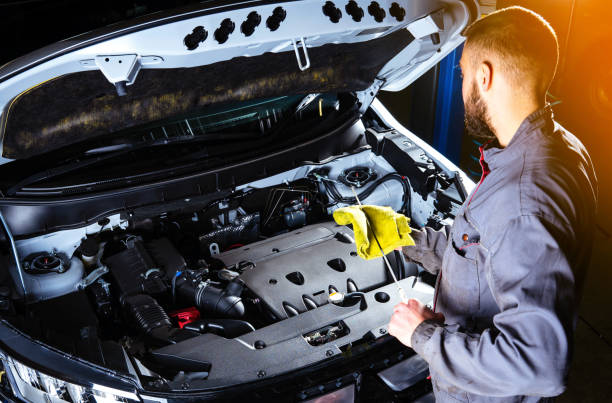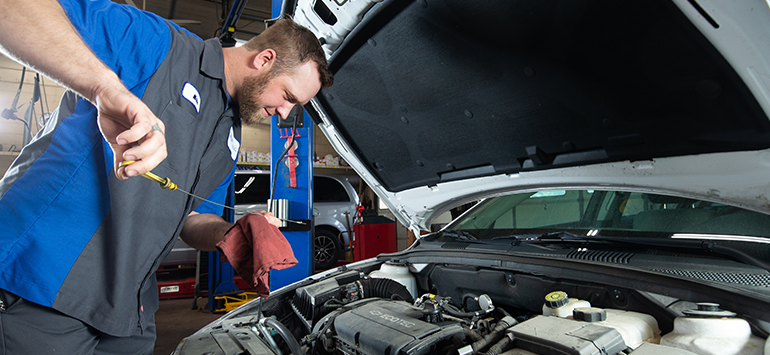Preserving the health and wellness of your vehicle's engine and transmission is necessary to guarantee its long-term performance and avoid pricey fixings. Taking preventive steps and establishing good behaviors can go a lengthy way in expanding the life expectancy of your cars and truck's engine and transmission.
To ensure your engine remains healthy and balanced, change the oil at periods advised by your cars and truck's producer-- typically every 3,000 to 5,000 miles. Be sure to use the appropriate oil quality and type for your auto, as specified in the owner's handbook. Changing the oil filter at the very same time will assist maintain the engine totally free and clean of contaminants.
Frequently check fluid levels and make certain the fluids are tidy and at the proper degrees. Have them changed without delay if you discover any kind of indications of leaks or dirty fluids. Follow your car maker's suggestions for fluid replacement intervals to keep every little thing running smoothly.
To extend the life of your engine and transmission, adopt smooth driving behaviors. Accelerate slowly, brake delicately, and prevent revving the engine needlessly. Also, try to prevent quick shifts or overloading your cars and truck. These behaviors will certainly not just help preserve your automobile's long life but also enhance fuel efficiency.
![]()
Make sure to examine the coolant level routinely and guarantee that the thermostat, radiator, and water pump remain in great functioning order. Purging the cooling system occasionally, as suggested by your car's producer, will certainly help prevent accumulation that can block the radiator and create getting too hot. Precautionary maintenance of the air conditioning system is important for keeping your engine and transmission cool.
To keep your transmission running smoothly, on a regular basis inspect the transmission liquid and change it according to the manufacturer's schedule. If your vehicle has a manual transmission, ensure to change the clutch liquid as well to ensure smooth gear shifts.
Constantly follow the producer's standards concerning pulling capacity and prevent overwhelming your automobile. If you need to tow consistently, take into consideration upgrading to a vehicle that is designed for heavy towing, or equip your present vehicle with extra transmission cooling devices.
![]()
Also, usage OEM (Original Tools Maker) components when replacing parts. These components are designed to fit your automobile specifically, making certain optimal efficiency. Avoid making use of economical, off-brand parts, as they might create compatibility issues and hurt your engine or transmission in the lengthy run.
Several mechanics also supply diagnostic services to assess the condition of the engine and transmission. These services can identify minor problems, like fluid leaks or components that are starting to wear down, enabling repair services before they result in expensive damage.
Attempt to combine errands or take longer journeys when possible to enable the engine to heat up effectively and go for peak performance. This method will reduce engine wear and enhance gas efficiency.
Verdict. Expanding the life of your automobile's engine and transmission needs normal treatment, attention, and excellent driving behaviors. By remaining on top of maintenance jobs like oil adjustments, fluid checks, and coolant system maintenance, you can guarantee and protect against significant concerns that your automobile runs efficiently for several years. Preventing hostile driving, overloading the car, and organizing normal upkeep will additionally assist you maintain your car's essential components. With these basic strategies, you can delight in a longer-lasting, trustworthy vehicle.
- Remain on Top of Oil Modifications. Normal oil adjustments are just one of the most basic yet essential jobs for expanding the life of your engine. Engine oil lubes the moving components within the engine, decreases friction, and assists prevent overheating. In time, oil breaks down and becomes less efficient, which can bring about boosted engine wear and potential damage.
To ensure your engine remains healthy and balanced, change the oil at periods advised by your cars and truck's producer-- typically every 3,000 to 5,000 miles. Be sure to use the appropriate oil quality and type for your auto, as specified in the owner's handbook. Changing the oil filter at the very same time will assist maintain the engine totally free and clean of contaminants.
- Preserve Proper Liquid Degrees. Along with engine oil, other fluids like transmission coolant, power, and liquid guiding liquid are essential to your automobile's operation. Reduced or contaminated liquid can cause efficiency concerns or major damage to your auto's systems. Transmission liquid aids oil the transmission's elements, and low liquid degrees can result in harsh shifting, overheating, or also transmission failing.
Frequently check fluid levels and make certain the fluids are tidy and at the proper degrees. Have them changed without delay if you discover any kind of indications of leaks or dirty fluids. Follow your car maker's suggestions for fluid replacement intervals to keep every little thing running smoothly.
- Drive Efficiently and Responsibly. Your driving habits directly affect the health and wellness of your engine and transmission. Hostile driving-- such as unexpected velocity, difficult braking, and speeding-- places unneeded strain on the engine and transmission. Frequent stop-and-go driving, specifically in city traffic, can also cause additional wear.
To extend the life of your engine and transmission, adopt smooth driving behaviors. Accelerate slowly, brake delicately, and prevent revving the engine needlessly. Also, try to prevent quick shifts or overloading your cars and truck. These behaviors will certainly not just help preserve your automobile's long life but also enhance fuel efficiency.

- Routinely Inspect the Air Conditioning System. Overheating is one of the leading reasons for engine and transmission failing. An appropriately operating cooling system is necessary for keeping the appropriate temperature for both your engine and transmission, especially under hefty tons or in heat.
Make sure to examine the coolant level routinely and guarantee that the thermostat, radiator, and water pump remain in great functioning order. Purging the cooling system occasionally, as suggested by your car's producer, will certainly help prevent accumulation that can block the radiator and create getting too hot. Precautionary maintenance of the air conditioning system is important for keeping your engine and transmission cool.
- Watch on Transmission Health. If you discover any of these signs, have the transmission inspected quickly. Proceeding to drive with a falling short transmission can trigger more damages to the engine and various other elements.
To keep your transmission running smoothly, on a regular basis inspect the transmission liquid and change it according to the manufacturer's schedule. If your vehicle has a manual transmission, ensure to change the clutch liquid as well to ensure smooth gear shifts.
- Prevent Straining the Auto. Straining your car positions too much pressure on both the engine and transmission. Towing hefty lots or bring way too much weight puts extra pressure on these components, triggering them to work harder than essential. This can bring about overheating, extreme wear, and prospective failing.
Constantly follow the producer's standards concerning pulling capacity and prevent overwhelming your automobile. If you need to tow consistently, take into consideration upgrading to a vehicle that is designed for heavy towing, or equip your present vehicle with extra transmission cooling devices.

- Use the Right Parts and Fuel. Making use of the proper fuel and components for your cars and truck is necessary to maintaining the health and wellness of your engine and transmission. Always comply with the producer's recommendations for fuel type. Utilizing premium gas when normal gas is suggested provides no benefit and may cost you more money without boosting efficiency.
Also, usage OEM (Original Tools Maker) components when replacing parts. These components are designed to fit your automobile specifically, making certain optimal efficiency. Avoid making use of economical, off-brand parts, as they might create compatibility issues and hurt your engine or transmission in the lengthy run.
- Set Up Normal Upkeep and Assessments. Routine maintenance is critical for identifying potential troubles prior to they become significant issues. Take your auto in for routine exams, also if you have not observed any kind of indicators of difficulty. A professional mechanic can inspect crucial components like the engine, transmission, brakes, belts, and hoses, and capture little problems early before they rise.
Several mechanics also supply diagnostic services to assess the condition of the engine and transmission. These services can identify minor problems, like fluid leaks or components that are starting to wear down, enabling repair services before they result in expensive damage.
- Prevent Short Trips. Frequent brief trips, specifically in cold weather, do not offer your engine enough time to completely heat up. When your automobile is continuously running in cold conditions for short periods, it does not reach its optimum operating temperature level. This can lead to ineffective gas combustion and cause the oil to thicken, that makes it harder for the engine parts to relocate smoothly.
Attempt to combine errands or take longer journeys when possible to enable the engine to heat up effectively and go for peak performance. This method will reduce engine wear and enhance gas efficiency.
Verdict. Expanding the life of your automobile's engine and transmission needs normal treatment, attention, and excellent driving behaviors. By remaining on top of maintenance jobs like oil adjustments, fluid checks, and coolant system maintenance, you can guarantee and protect against significant concerns that your automobile runs efficiently for several years. Preventing hostile driving, overloading the car, and organizing normal upkeep will additionally assist you maintain your car's essential components. With these basic strategies, you can delight in a longer-lasting, trustworthy vehicle.
Navigation
Home
Latest Posts
Why Pick Basil Mitsubishi for Your Car Solution Requirements
Published May 25, 25
1 min read
Experience Quality at Jake Sweeney Mazda
Published May 24, 25
2 min read
The Jake Sweeney Mazda Certified Advantage
Published May 23, 25
1 min read